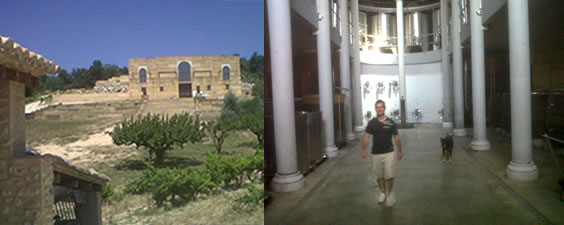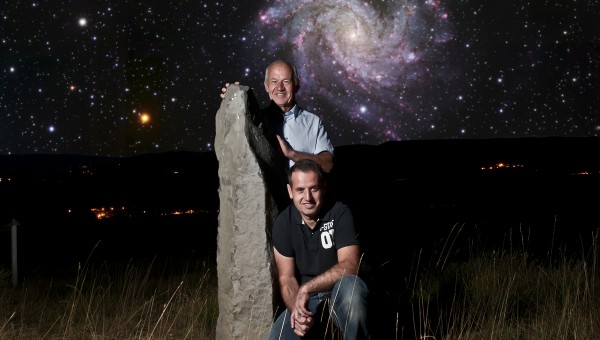
Domaine Viret Wines
All Domaine Viret wines are gluten free and vegan friendly.
In our search for no added preservative (sulphite free) wines, we’ve been extremely fortunate to have discovered Domaine Viret, a truly unique family winery in St Maurice just north of Chateauneuf du Pape. You may remember the winery from the BBC’s Oz Clarke and James May episode in 2006 where Oz described their wines as ‘cosmic nectar’, and thoroughly enjoyed working his way through several of their best bottles while camped in the vineyard.
Domaine Viret is owned by Alain and his son Philippe, and is based on a natural philosophy which surpasses organic and biodynamic, which they call ‘cosmoculture’. It encompasses an array of natural approaches from producing their own plant food for the vines from 14 different plants from the vineyard, to adopting Aborigine and American Indian philosophies about the earth’s energy fields and the cell structure of water. They even built the winery in a specific location to harmonise with the earth’s natural rhythms.
Now I’m normally a little sceptical, but I was so impressed by their wines that I had to take a look at the winery and vineyards for myself. Their cosmoculture system is extremely in depth, and my French isn’t very good so I only understood some of the very basics. But I certainly understood one thing – whatever their secret, they have a winery that is truly unique in the world, that produces wines beyond the capabilities of any other winemaker I’ve met. Virtually every winemaker will tell you ‘you can’t make a wine without the addition of sulphur that will keep more than a few months’ – I was told exactly that by a South African ‘organic’ producer earlier this year. However, over lunch Philippe opened a bottle of his Colonnades 2000, and a bottle of Emergence 1999 which were both absolutely stunning with beautifully ripe fruit. That’s sulphur free wine which has not only kept for 10 years but is in premium condition, and is a masterpiece of winemaking.
Organic wine in the European Union doesn’t officially exist. You will notice such wines have to be labelled ‘wine made from organically grown grapes’. This is because only the grape growing is organically certified – once the grapes hit the winery to be vinified, almost anything can happen to them including the addition of sulphur and other chemicals, but they still achieve their ‘organic’ status. This is why many organic wines are just as high in free sulphur as any other wine. Alain and Philippe however, extend their philosophy to every part of the winemaking from the fertilisation and watering of the vineyards to the final production of the wine and even bottling and storage. Their wines are the purest I have ever tasted, and it is perhaps the absence of any chemicals that gave me the feeling of being energised when I drank them. Jane and I sat on our decking in the sun sampling their wines, and we actually drank ‘several’ bottles on a Sunday afternoon. Normally a bottle each would be our limit, but we just kept remarking how great we felt – ‘shall we open the next one up?’ We were a little tipsy certainly but felt full of energy. We both got up for work in the morning fresh as a daisy. Now, normally if I have 3 pints of UK brewed lager, I’m sluggish and tired all day! Clearly it isn’t the quantity of alcohol that causes this effect, it’s the plethora of chemicals I’m imbibing.
UPDATE 1st August 2012
From today there is a new EU Classification of “EU Certified Organic Wine” which also permits the new EU Organic logo to be displayed on the bottle. But don’t be conned! – These wines are still permitted to contain 44 different chemicals and very high levels of sulphites -150 mg/l for dry whites and rose wines, 100 mg/l for reds and a whopping 370 mg/l for dessert wines. Plus the wineries are permitted to exceed these levels if they feel there is just cause! These wines are not natural or low sulphite, and it makes a mockery of the whole organic certification system. This new logo will be appearing on bottles on shelves in the local supermarket – be very cautious if you have a sulphite allergy!
These chemicals affect us in many ways we don’t realise. I strongly remommend you try Domaine Viret’s wines, and experience this for yourself. Not only are they possibly the healthiest wines money can buy, they’re also delicious in their own right.
Current Free Sulphur Update
Domaine Viret sent all their wines to have their sulphur content analysed for us a couple of weeks ago (July 2010). The ‘Limite de Quantification’ (the limit below which the laboratory don’t even record the amount) is 5 mg/l for Free Sulphur and 10 mg/l for Total Sulphur. Their wines are so low in sulphur that only the Rose and White had anything recorded – the reds were all virtually undetectable. The Rose showed 6 mg/l Free and 11 mg/l Total, and the white, Coudee D’Or, was below the minimum Free and 15 mg/l Total. This is remarkable. We are talking about 15 parts per MILLION in total! In a normal well made, quality white wine the Free Sulphur would be about 60 mg/l, and the Total sulphur upto 210 mg/l.
Just a quick word of warning if you like to make your bottle last over a few nights. Sulphite free wines, once opened, will react to oxygen more quickly than wines containing artificial preservatives. To stop them spoiling, replace the cork immediately each time you pour a glass to minimise the contact with the air. If you regularly drink just a glass a night it may be worth buying a Vacuvin to pump out the air completely so it will keep in good condition for several days.
June 2012 – Quote in the Toronto Evening Standard from Master Sommelier and wine writer John Szabo taken from a piece he wrote about Domain Viret’s Cosmoculture system:
“Cosmoculture is meaningless to the drinker who sits on the other side of the planet, hoping for a nice glass of wine. And to be honest, I wouldn’t be writing this piece if the wines were mediocre, or even decent commercial. But they’re much more than that: the wines are extraordinary.”
You can view Philippe’s wines on our sulphite free wines page:



